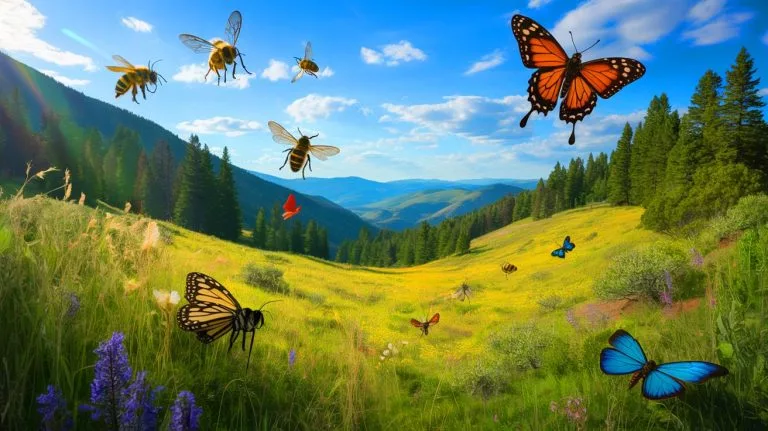| IN A NUTSHELL |
|
In a remote, untouched meadow in Colorado, scientists have uncovered a startling revelation about the state of our ecosystems. Over the past 20 years, populations of flying insects have plummeted by over 70%. This decline has been intricately linked to rising summer temperatures, a consequence of climate change. The findings, part of a study conducted by the University of North Carolina at Chapel Hill, raise alarms about the resilience of ecosystems previously thought to be unaffected by human activities. As the world grapples with the broader impacts of climate change, this research highlights the vulnerabilities even in places considered pristine.
The Vulnerability of So-called Pristine Ecosystems
Keith Sockman, an associate professor of biology at UNC-Chapel Hill, led this groundbreaking study in Molas Pass, Colorado. This subalpine meadow, situated at an elevation of 10,500 feet, is adjacent to the state’s largest wilderness area. The site, covering 37 acres, has experienced minimal human impact over the years. Despite its remoteness, the study found that this ecosystem is not immune to climate-induced changes.
Insects, the focus of this research, play a critical role in maintaining ecosystem balance. They contribute to nutrient cycling and pollination, making them indispensable to the functioning of both terrestrial and aquatic environments. However, their sensitivity to environmental changes also makes them vital indicators of ecosystem health. This study, one of the first to analyze insect declines in such an untouched environment, fills a significant gap in global insect research.
The Methodology Behind the Discovery
From 2004 to 2024, researchers employed a meticulous methodology to track insect populations. They set up six standardized yellow traps across the meadow, using water and detergent to capture insects weekly during the summer months. The collected insects primarily included flies and true bugs, known as Diptera and Hemiptera, respectively.
The insects were preserved in vials containing 70% ethanol and analyzed to determine the impact of climate variables. Researchers utilized data spanning 38 years to assess the influence of climate on insect abundance. The results were alarming: a 72.4% decline in insect populations over two decades, with an average annual decrease of 6.6%. These findings were closely tied to rising summer temperatures, demonstrating the profound impact of climate change on even the most secluded ecosystems.
A Closer Look at Climate Change’s Role
The study employed an information-theoretic approach to evaluate the effects of previous summer temperatures on insect populations. Elevated temperatures during one summer correlated with reduced insect numbers in the following year. This lag effect underscores the complex interplay between climate variables and ecosystem health.
As the study reveals, remote ecosystems are not insulated from the broader trends of climate change. The rising summer temperatures in the Colorado meadow reflect larger climatic shifts occurring globally. This suggests that even in areas with minimal human interference, the impacts of climate change are both pervasive and profound.
Implications for Global Biodiversity Conservation
The dramatic decline in insect populations captured in this study highlights the global scale of the biodiversity crisis. Insects are not only crucial for maintaining ecological balance but are also foundational to the food web. The loss of these populations can have cascading effects on other species, ultimately threatening the stability of entire ecosystems.
Researchers emphasize the need for comprehensive monitoring and conservation efforts to address these challenges. As climate change continues to alter habitats, understanding its impact on biodiversity becomes increasingly critical. The insights gained from this study in Colorado could inform conservation strategies worldwide, helping to mitigate the effects of climate change on vulnerable ecosystems.
The findings from Molas Pass serve as a wake-up call for scientists, policymakers, and conservationists alike. As we better understand the intricate connections between climate change and biodiversity loss, the question remains: How can we effectively safeguard our ecosystems for future generations?
Did you like it? 4.6/5 (23)





Wow, this is really alarming. How are we supposed to address climate change if even the most remote areas are affected?
Wow, 72% is a huge number! What can be done to help reverse this trend? 😮
Isn’t this just part of a natural cycle? I mean, insects have been around for millions of years.
Can someone explain why insects are so important to the ecosystem? 🤔
Thanks for sharing this important research. We need more awareness about climate change’s impacts!
Are there specific insects that are more affected than others?
Not to downplay this, but could the decline be due to other factors like pollution?
This is terrifying! How can we expect our ecosystems to survive without insects?
Thanks for sharing this critical research. We need more awareness on climate change impacts.